武汉大学考博英语经典复习方法
医学考博英语的备考技巧

【导语】考博指报考博⼠⽣的考试,博⼠研究⽣考试分为春季考试和秋季考试两种,⼀般来说春季考试在三⽉份进⾏,九⽉份⼊学。
以下是整理的医学考博英语的备考技巧,欢迎阅读!医学考博英语的备考技巧 1、了解⾃⼰对题型的掌握 通过对真题的分析总结,了解⾃⼰对真题中某部分的知识的掌握情况,哪部分为弱项,需要加强。
从⽽有针对性地进⾏加强。
2、平均分配各题型时间 医学考博试卷的题型,题量⼤都相似,可以以真题作参考,把每次真题训练当做⼀次模考,测试⾃⼰的做题速度,再有计划地训练⾃⼰对某部分题型上所花的时间。
3、选题不同于普通考博英语试卷 医学考博的真题选材⼤多涉及医学类、⾝体健康、⽣活习惯等。
可通过真题分析,来研究历年的医学考博英语选题,增加⾃⼰的知识储备量。
4、词汇是基础 考博英语词汇上万,全部记下来是⼏乎不可能的。
挑真题⾥不认识的单词记忆是⼀个很不错的办法。
尤其是医学考博英语,拥有⼤量医学专有名词,历年真题⾥的单词的重复率是⾮常⾼的,坚持每天记忆,就会发现做题越来越顺。
5、总结出题规律 历年的试题其实是有⼀定的规律性的,对于不同的题⽬,有不同的出题思路,了解出题思路,问题才能得到有效解决,因此,只有通过⼤量的做题,发现出题的规律。
了解出题思路对于做对题来说,成为关键。
正所谓发现思路,找到规律,才是掌握医学考博英语阅读技巧的有效途径。
在职博⼠考试重点 在职博⼠研究⽣招⽣概况:在职的博⼠⽣招⽣⼯作的计划、报名和考试⽇期全国未作统⼀规定,由各招⽣单位⾃定。
各招⽣单位的招⽣专业⽬录、公布时间、邮购或索取的⼿续、⽅式等均不同。
考⽣应注意招⽣单位的站和招⽣⼴告,或与招⽣单位取得联系。
那么在职博⼠考试如何抓重点: 1、必须抓住所考科⽬的“核⼼要素”。
任何⼀门学科都有⼀系列重点,必须把这些问题搞清楚。
即使考题跑出了你的重点范围,运⽤你所掌握的“核⼼知识”,答题也不会差很远。
也就是说专业课的基本原理、基本概念、基本知识必须具备。
考博英语词汇精讲

考博英语词汇精讲考博英语词汇精讲主讲: 马振旗加强⼤纲词汇的记忆,不同场合的搭配,深度词义的记忆,提⾼语法知识,做真题,⽆⾮就是考三点:近似词、近义词和词组词汇解题思路:1)提炼主⼲;2)搭配关系;3)句⼦结构;4)词汇辨析;5)⼀词多义1)提炼主⼲A)化繁为简,分清结构B)分析成分,确定词性C)理顺逻辑,辨析词义After his uncle died, the young man ______ the beautiful estate with which he changed from a poor man to a wealthy noble.A. inhabitedB. inheritedC. inhibitedD.interested2)搭配关系A)背词不搭配,受累⼜⽩费。
(深度记词,活学活⽤)B)全句谓语是中⼼,前思后想看动宾I _____ a lot of knowledge from my trip to Africa.A. learnB. studyC. obtainD. achieve1. Blue, yellow and red are _____ colors.A. criticalB. essentialC. primary(原⾊)D. necessary2. All All her hard work ______ in the end, and she finally passed the exam.A. showed off 显耀B. paid offC. left off离开D. kept off阻⽌3. The opportunity to explore and play and the encouragement to do so can _____ the performance of many children.A. withholdB. preventC. enhanceD. justify3)句⼦结构A)简单B)并列a) 同义b) 递进c) 反义In 1991, while(尽管) the economies of industrialized countries met an economic ______, the economies of developing countries were growing very fast.A. revival复苏B. repression压迫C. recession衰退D. recovery恢复C)复合(状语从句)a) 时间b) 地点c) 条件d) ⽐较e) 让步f) ⽅式g) 原因h) ⽬的i) 结果I don’t think you’ll change his mind; once he’s decided onsomething, he tends to ______ it.A. stick toB. give upC. comply with符合D. put off4)词汇辨析(考试主要部分)1)近义It is estimated that, currently, about 50,000 species become ______ every year.A. extinct灭绝B. instinct直接C. distinct区分D. intense剧烈2)近似(仔细⽐较词性、⽤法、搭配)We aim to ensure that all candidates are treated fairly and that they have equal ______ to employment opportunities.A. entrance进⼊B. entry进⼊C. access进⼊D. admission允许进⼊3)词组Tom placed the bank notes, _____ the change and receipt, back in the drawer.A. more than⽽不是B. but for要不是C. thanks to由于,归功于D.along with与。
博士英语考试题型

博士英语考试题型在博士英语考试中,考生需要熟悉各种题型,以便有效地准备和应对考试。
本文将介绍常见的博士英语考试题型及其特点,帮助考生理解并有效应对考试。
一、阅读理解题阅读理解题是博士英语考试的重点题型之一。
该题型要求考生根据篇章内容,理解和分析文章的主旨、观点、论证过程等,并回答相关问题。
阅读理解题分为短文理解和长篇理解两种。
短文理解通常包括若干篇短文,每篇短文后跟有若干问题。
长篇理解则是一篇长篇文章,后面跟有一系列问题。
答题技巧:1. 仔细阅读文章:通读全文,了解文章主题和结构,捕捉关键信息。
2. 抓住问题关键词:在阅读问题时,注意关键词,理解问题要求,快速定位答案。
3. 筛选选项:对于选择题,排除干扰选项,从剩余选项中选择最合适的答案。
二、完形填空题完形填空题主要考察考生的语法和词汇运用能力,以及对文章上下文的理解能力。
该题型在一篇短文中留有若干个空白处,考生需要根据上下文补全合适的单词或短语。
答题技巧:1. 阅读全文:快速阅读全文,理解大意和文章的逻辑结构。
2. 掌握文章情节:通过阅读,了解文章的叙述顺序和发展过程,帮助理解空格前后的内容。
3. 根据上下文选择答案:尝试选择与空格前后信息衔接紧密、符合语法和意义的选项。
三、听力理解题听力理解题是博士英语考试的难点题型之一。
该题型要求考生根据听到的对话或独白,回答相关问题。
听力理解题分为短对话和长对话独白两种。
短对话通常包括若干段对话,每段对话后跟有一个问题。
长对话独白则是一段较长的对话或独白,后面跟有一系列问题。
答题技巧:1. 专注倾听:注意听力材料的语速、语调和重点信息,集中注意力,避免分神。
2. 做好笔记:在听力材料播放过程中,尝试记下关键词,以方便后续回答问题。
3. 预测答案:根据听到的信息,尝试预测答案,准确把握问题的要求。
四、写作题写作题是博士英语考试的关键题型之一。
该题型要求考生在规定的时间内,根据题目要求,完成一篇短文写作。
写作题通常包括作文或短文写作等。
考博英语题型
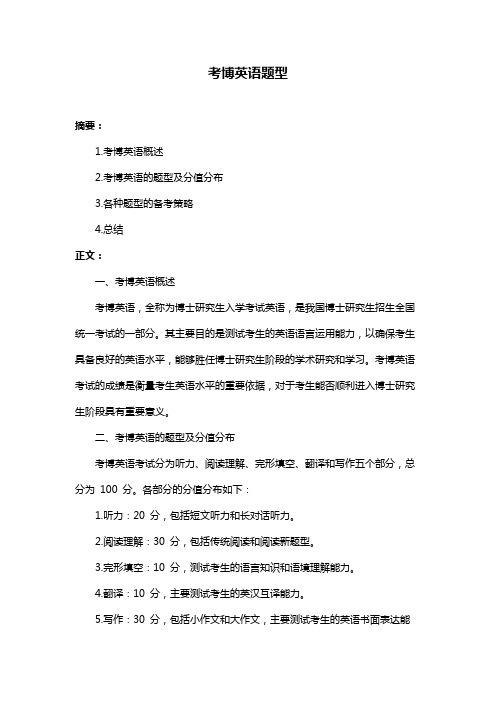
考博英语题型摘要:1.考博英语概述2.考博英语的题型及分值分布3.各种题型的备考策略4.总结正文:一、考博英语概述考博英语,全称为博士研究生入学考试英语,是我国博士研究生招生全国统一考试的一部分。
其主要目的是测试考生的英语语言运用能力,以确保考生具备良好的英语水平,能够胜任博士研究生阶段的学术研究和学习。
考博英语考试的成绩是衡量考生英语水平的重要依据,对于考生能否顺利进入博士研究生阶段具有重要意义。
二、考博英语的题型及分值分布考博英语考试分为听力、阅读理解、完形填空、翻译和写作五个部分,总分为100 分。
各部分的分值分布如下:1.听力:20 分,包括短文听力和长对话听力。
2.阅读理解:30 分,包括传统阅读和阅读新题型。
3.完形填空:10 分,测试考生的语言知识和语境理解能力。
4.翻译:10 分,主要测试考生的英汉互译能力。
5.写作:30 分,包括小作文和大作文,主要测试考生的英语书面表达能力。
三、各种题型的备考策略1.听力:多做听力练习,尤其是模拟试题和真题,提高听力水平和答题速度。
同时,注意积累常用词汇和短语,提高听力理解能力。
2.阅读理解:提高阅读速度和理解能力,善于捕捉文章的主旨和细节。
多做阅读练习,积累词汇和语法知识,提高阅读水平。
3.完形填空:熟悉完形填空题型,掌握解题技巧。
通过多做练习,提高对语境的理解和词汇运用能力。
4.翻译:熟悉英汉互译的技巧和方法,积累常用短语和句型。
通过练习,提高翻译准确性和表达能力。
5.写作:掌握写作技巧和方法,注重文章结构和逻辑性。
多做写作练习,提高英语书面表达能力。
四、总结考博英语考试是对考生英语水平的一次全面测试,各题型的备考需要有针对性地进行。
武汉大学 博士学位英语 期末考试复习资料
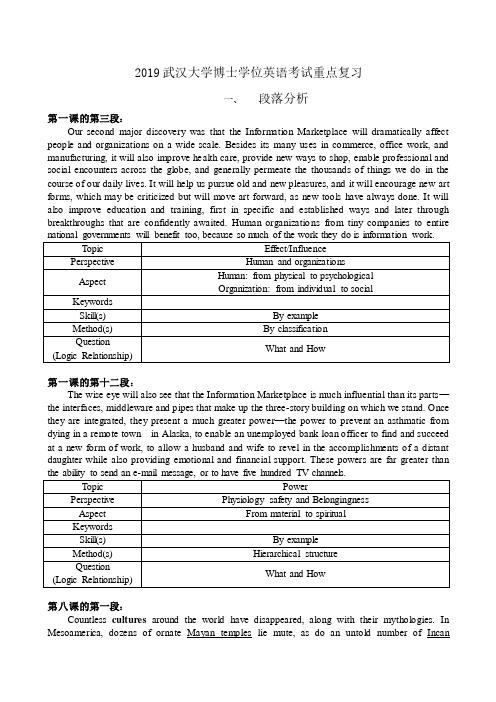
2019武汉大学博士学位英语考试重点复习一、段落分析第一课的第三段:Our second major discovery was that the Information Marketplace will dramatically affect people and organizations on a wide scale. Besides its many uses in commerce, office work, and manufacturing, it will also improve health care, provide new ways to shop, enable professional and social encounters across the globe, and generally permeate the thousands of things we do in the course of our daily lives. It will help us pursue old and new pleasures, and it will encourage new art forms, which may be criticized but will move art forward, as new tools have always done. It will also improve education and training, first in specific and established ways and later through breakthroughs that are confidently awaited. Human organizatio ns from tiny companies to entire第一课的第十二段:The wise eye will also see that the Information Marketplace is much influential than its parts—the interfaces, middleware and pipes that make up the three-story building on which we stand. Once they are integrated, they present a much greater power—the power to prevent an asthmatic from dying in a remote town in Alaska, to enable an unemployed bank loan officer to find and succeed at a new form of work, to allow a husband and wife to revel in the accomplishments of a distant daughter while also providing emotional and financial support. These powers are far greater than第八课的第一段:Countless cultures around the world have disappeared, along with their mythologies. In Mesoamerica, dozens of ornate Mayan temples lie mute, as do an untold number of Incanmonuments in Peru, Celtic cairns in Wales, Khmer statues in Cambodia, and magnificent第八课的第二段Easter Island, celebrated for the giant statues left by its vanished civilization, is unique in archaeology because of its isolation from its neighbors. Current archaeological evidence indicates that some 1,600 years ago the island's first settlers, explorers from Polynesia, found themselves in a pristine paradise with subtropical forests, dozens of wild bird species, and no predators. They multiplied and prospered, distributing resources in a manner that suggests a sophisticated economy and complex political system. Rival clans erected ever-larger statues on platforms, emulating the stone carvings of their Polynesian forebears, trying to surpass each other with displays of power and wealth.第八课的第四段:It is likely that changes in the forest occurred over decades and would have been difficult to detect immediately. An islander might easily have missed the long-term trend, thinking: “This year we cleared those woods over there, but trees are starting to grow back again over here.”Furthermore, any islander who issued a warning against the oncoming disaster would have been silenced by the ruling class. Chiefs, priests, and stone carvers all depended on the status quo to第八课的第六段:Humanity may not act in time to prevent the decimation of the rain forests, fossil fuels, arable land, and fisheries. In only 40 years, Ethiopia’s forest cover shrank from 30% to 1%. During the same time period, the rest of the world lost half of its rain forests. Powerful decision-making groups ignore those who sound an alarm; their political, economic, and religious agendas fail to address the第八课的第八段:If we are going to avoid the fate of the Easter Islanders, we must change the myths that are leading us toward extinction and find inspiring visions of a plausible and appealing future. The old myths have collapsed, but no new ones have emerged to fill the vacuum. For transformation to occur, human beings must actively shape the future, an enterprise that goes to the heart of mythmaking. If we are each a cell in what Peter Russell calls “The Global Brain,”then this is an第八课的第十二段:But as the Grand Narrative of Progress came to dominate other values and views, it cast a malignant shadow. The invention of the automobile was the quintessence of progress, but it left overcrowded highways, air pollution, and deforestation in its wake. Fertilizers increased crop production but also increased the growth of algae in lakes and canals. The discovery of powerful insecticides——first greeted with enthusiasm and a Nobel Prize——was followed by the unintentional poisoning of fish, birds, and animals. Nuclear power plants increased available energy but led to storage problems, life-threatening contamination, and at least one accident with worldwide repercussions. The waste products of technological living began to choke great cities and foul once-pristine lands. Although Western housing, clothing, and religion were brought to aboriginal people, and the rate of infectious disease went down, the rate of alcoholism, drug第八课的第二十五段:The third principle is to identify real-life situations in which antagonists can find common ground. With a recognition of the limitations of linguistic exchange, postmodernists urge that groups “press beyond dialogue.”For example, athletes and musicians from all walks of life can generate smooth and effective teams or musical groups. Business executives and scientists from conflicting backgrounds are often able to work together to generate multinational corporations and二、文章结构分析第八课1-4段Countless cultures around the world have disappeared, along with their mythologies. In Mesoamerica, dozens of ornate Mayan temples lie mute, as do an untold number of Incan monuments in Peru, Celtic cairns in Wales, Khmer statues in Cambodia, and magnificent ziggurat-like structures in central Africa.Easter Island, celebrated for the giant statues left by its vanished civilization, is unique in archaeology because of its isolation from its neighbors. Current archaeological evidence indicates that some 1,600 years ago the island’s first settlers, explorers from Polynesia, found themselves in a pristine paradise with subtropical forests, dozens of wild bird species, and no predators. They multiplied and prospered, distributing resources in a manner that suggests a sop histicated economy and complex political system. Rival clans erected ever-larger statues on platforms, emulating the stone carvings of their Polynesian forebears, trying to surpass each other with displays of power and wealth.Eventually, as the island’s population grew to 20,000 people, the forests were cut more rapidly than they regenerated. Trees were transformed into fuel, canoes, and houses, as well as rollers and ropes to transport the gigantic stone heads. In time, the absence of wood for sea going canoesreduced the fish catches, while erosion and deforestation diminished crop yields. The growing populace consumed the local bird and animal populations. When the island could no longer feed its human population, the political and religious oligarchy that had directed and distributed the local resources began to languish. Many archaeologists believe the ruling class was overthrown by warriors. In the ensuing disorder, clan fought clan fought clan, toppling and desecrating each other’s statues. When the Europeans arrived on Easter Sunday, 1772, the once-fertile island was barren and desolate. Its remaining inhabitants, only a fraction of the numbers a few generations earlier, were heirs to a once-greater society that had degenerated into violence, starvation, and cannibalism.It is likely that changes in the forest occurred over decades and would have been difficult to detect immediately. An islander might easily have missed the long-term trend, thinking: “This year we cleared those woods over there, but trees are starting to grow back again over here.”Furthermore, any islander who issued a warning against the oncoming disaster would have been silenced by the ruling class. Chiefs, priests, and stone carvers all depended on the status quo to retain their positions and privileges.附:武汉大学博士研究生英语试题Part I Documental Analysis 20%Attention: Analyze the following paragraph according to the requirements of perspective, method and skill, and questions.But as the Grand Narrative of Progress came to dominate other values and views, it cast a malignant shadow. The invention of the automobile was the quintessence of progress, but it left overcrowded highways, air pollution, and deforestation in its wake. Fertilizers increased crop production but also increased the growth of algae in lakes and canals. The discovery of powerful insecticides--first greeted with enthusiasm and a Nobel Prize--was followed by the unintentional poisoning of fish, birds, and animals. Nuclear power plants increased available energy but led to storage problems, life-threatening contamination, and at least one accident with worldwide repercussions. The waste products of technological living began to choke great cities and foul once-pristine lands. Although Western housing, clothing, and religion were brought to aboriginal people, and the rate of infectious disease went down, the rate of alcoholism, drug addiction, suicide, and spouse and child abuse went up.Part II Article Analysis 15%Attention:Fill the chart according to the requirements based on your understanding of the following article.1. We live in times that are harsh but exciting, where everyone agrees that we are moving to a new level of civilization. Principles, values, ways of life, will no longer be the same; but as yet we are not really ready for these changes; we are faced with inventing the future and also bringing it into operation, progressively; we make experiments and we frequently make mistakes; but we are beginning to know what we want when we talk of justice, freedom and democracy. The scientific and technological community is directly involved in the questions that arise. Following those ofour generation, the demands of your generation will continue until these aims have been at least partially achieved.2. The closeness of scientific problems to political problems is such that scientific workers are not, far from it, protected from socio-economic vicissitudes. So much so that they sometimes express the same needs as all other workers and join them in this context; but they also call for specific measures. Like everyone else we need freedom but we especially need freedom of expression for our scientific and technological ideas; we need this even if it is only to put them forward for criticism. We don't ask for any particular privilege but we would like the efforts made to be evaluated at their actual worth, in the interests of society.3. If our federation is so active in working for a statement of the rights and responsibilities of scientific workers, it is because we wish to resolve this problem in a way appropriate to most countries.4. So you will certainly play an important part in society, even if this is not always readily recognized by society, because scientific and technological knowledge and expertise are the context in which future economic, social and political changes will take place. Whatever you do, you cannot ignore them and, whatever is said, society will not be able to ignore you. You will also have a decisive part to play, and perhaps an even more difficult one, in the scientific and technological community itself. The whole extension of this community and its interaction with society as a whole leads scientific workers to get involved in all political debates, crises and decisions. You will have to note the essential demands of science as such; it is not simply a matter of protecting society from unacceptable consequences; one must also protect scientific activity from political and financial meddling.5. It is vital to safeguard the basic honesty of science, the honesty that is basic to its metho d. Whenever, in the history of science, this honesty has been set aside, the consequences have been serious. I am not speaking merely of the suicide or disgrace of an individual but of the social and economic damage arising from such lapses. There are worse possibilities: at a time when problems are increasingly complex, with ever widening political implications, we need science to be technically dependable and socially credible. In a world of turbulence, science's saving grace is not simply material but lies in its rationality.Part III Writing 25%Attention: Write an essay on the following topic with substantial evidence and good reasoning (e.g.in a linear way) in more than 300 words.How to Write English Well as a PhD Candidate---- On My Class ExperiencePart I. Documental Analysis 20% Topic: ______________________________ ______________________________Perspective(s): ____________________________________________________Method(s): ______________________________________________________Skill(s): _______________________________ _______________________________Questions: ________________________________________________________Part II. Article Analysis 15%。
考博词汇讲解

高频词汇重复十二次的词汇 obscure 重复十次的词汇 ambiguous 重复九次的词汇 initiate 重复8次的词汇 adhere 重复七次的词汇 cherish 重复六次的词汇 ascribeCoincide overwhelm overwhelming pursuit 重复五次的词汇 comply with 遵守服从Conspicuous endeavor homogeneous heterogeneous immerse indulge persistent Retrieve revive suppress testify accustom方法一:中心语义引领 + 正反对比法“贫穷”系列 poverty impoverish destitute penniless“富有”系列 opulent affluent wealthy well off“节约”系列 thrifty frugal economical“浪费”系列 extravagant lavish prodigal luxurious“遵守” abide by observe follow comply with conform to“违反” run against violate offend“一致” in line with in accordance with in correspondence withIn concordance with in agreement with in harmony with“冲突,矛盾” contradiction conflict clash discrepancy“繁荣” booming flourish thrive prosper“萧条” recession depression slack“破环” devastate destroy crash collide wreck“说话” vociferous loquacious talkative verbose“沉默” taciturn tacit reserved uncommunicative“起源” arise from be derived from“赞美” adulatory flattery commend“贬损” contemptuous despicable scorn belittle “轻视”“同化” assimilate homogenize “异化” heterogenize“勇敢” audacious bold gallant brave“懦弱” coward vulnerable feeble frail fragile“含蓄” implicit “外露” explicit“狡猾” sly cunning disingenuousness dishonesty“诚实” honest genuine ingenuous“负债” liability “资产” asset“控告起诉” accuse charge prosecute sue indict convict“加重” aggravate worsen deteriorate “缓减” alleviate relieve“程度范围比例比率等级规模”(extent scope proportion rate ratio scale rank)“影响”(impact on have an influence on ,have an effect on )方法二:字母引领 acrimonious bicker cadence devour extraneous fanaticism genesis hilarious insula tor javelin keen lure morbid nuzzle 依偎 ozonepugnacious quiescence rampant sentimentality terrace ultimate ultraviolet versatile wrestle x-ray yielding zenith方法三:根缀引领: trans- de- mis- dis- mal- macro- micro- hyper- re- im- in-Act verse tract sect opt press pose方法四:历年真题核心词重复; 清华历年考词方法五:固定习语 bear grudge against put the cart before the horse方法六:词形近似 athletic athlete aesthetic ethic ethnic euthanasia 方法七:高频系列 initiate obscure。
博士英文阅读技巧

博士英文阅读技巧Here is an essay on the topic of "Doctoral-Level English Reading Techniques" with more than 1000 words, written entirely in English without any additional punctuation marks in the body of the text.Doctoral-Level English Reading TechniquesProficiency in English reading is a critical skill for doctoral students and researchers as they navigate the vast body of literature in their fields. Effective English reading techniques go beyond simply decoding words on a page and involve a deep understanding of the content, structure, and nuance of academic texts. In this essay we will explore several key strategies that can help doctoral students and researchers enhance their English reading abilities and maximize the value they derive from the literature they engage withOne fundamental aspect of doctoral-level English reading is the ability to rapidly and efficiently extract the key information from a text. This requires a strategic approach to reading that goes beyond a linear progression from beginning to end. Skilled readers at the doctoral level will often begin by quickly skimming a text to get a sense of the overall structure, central themes, and main arguments.This allows them to develop a conceptual framework for understanding the content before delving into the details. Techniques such as reading section headings, scanning for topic sentences, and identifying thesis statements can help readers quickly zero in on the essential informationAnother critical skill is the ability to critically evaluate the content of a text. Doctoral-level readers must develop the capacity to assess the validity of an author's claims, the strength of their reasoning, and the quality of the evidence presented. This involves carefully considering the underlying assumptions, biases, and limitations of a study or argument. Readers should also be attuned to potential contradictions, gaps in logic, or counterevidence that may undermine the author's conclusions. Developing this critical lens is essential for doctoral students and researchers as they engage with the scholarly literature in their fieldsIn addition to extracting key information and critically evaluating content, doctoral-level English reading also requires the ability to synthesize and integrate ideas across multiple texts. Effective readers at this level do not treat each article, book, or report in isolation but instead seek to understand how different sources relate to and build upon one another. This involves identifying common themes, points of convergence and divergence, and opportunities for novel connections between disparate works. By developing this syntheticcapacity, doctoral students and researchers can begin to see the bigger picture and locate their own work within the broader scholarly landscapeAnother important aspect of doctoral-level English reading is the ability to navigate complex and highly technical language. Academic texts in many fields are replete with specialized terminology, intricate theoretical frameworks, and dense, information-rich prose. Skilled readers must be able to unpack this kind of challenging content, deciphering unfamiliar vocabulary, unpacking complex sentence structures, and distilling the essential meaning. Strategies such as careful re-reading, consulting reference materials, and actively engaging with the text can help readers overcome these linguistic hurdlesFinally, doctoral-level English reading requires a high degree of focus, persistence, and intellectual curiosity. Engaging with scholarly literature at this level is a demanding and often arduous process that can be mentally taxing. Readers must be willing to grapple with ambiguity, tolerate uncertainty, and push through moments of confusion or frustration. They must also maintain a sense of intellectual curiosity, constantly seeking to expand their understanding and discover new insights. Developing habits of mind such as patience, perseverance, and a genuine interest in the subject matter can help doctoral students and researchers sustain theintense level of engagement required for effective English reading at the highest levelsIn conclusion, mastering doctoral-level English reading techniques is essential for success in graduate education and academic research. By employing strategies for rapidly extracting key information, critically evaluating content, synthesizing ideas across multiple sources, navigating complex language, and sustaining deep intellectual engagement, readers can maximize the value they derive from the scholarly literature in their fields. These skills not only facilitate the successful completion of degree requirements but also lay the foundation for making meaningful contributions to one's area of study. As such, the development of advanced English reading abilities should be a central focus for all doctoral students and researchers seeking to excel in their academic pursuits。
考博英语题型
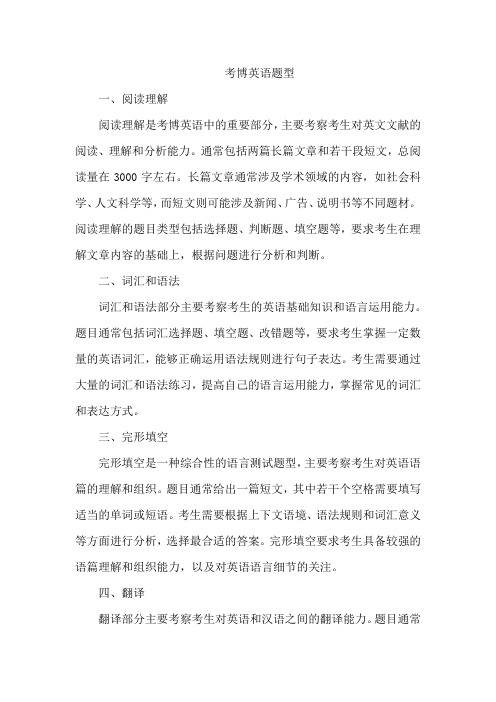
考博英语题型一、阅读理解阅读理解是考博英语中的重要部分,主要考察考生对英文文献的阅读、理解和分析能力。
通常包括两篇长篇文章和若干段短文,总阅读量在3000字左右。
长篇文章通常涉及学术领域的内容,如社会科学、人文科学等,而短文则可能涉及新闻、广告、说明书等不同题材。
阅读理解的题目类型包括选择题、判断题、填空题等,要求考生在理解文章内容的基础上,根据问题进行分析和判断。
二、词汇和语法词汇和语法部分主要考察考生的英语基础知识和语言运用能力。
题目通常包括词汇选择题、填空题、改错题等,要求考生掌握一定数量的英语词汇,能够正确运用语法规则进行句子表达。
考生需要通过大量的词汇和语法练习,提高自己的语言运用能力,掌握常见的词汇和表达方式。
三、完形填空完形填空是一种综合性的语言测试题型,主要考察考生对英语语篇的理解和组织。
题目通常给出一篇短文,其中若干个空格需要填写适当的单词或短语。
考生需要根据上下文语境、语法规则和词汇意义等方面进行分析,选择最合适的答案。
完形填空要求考生具备较强的语篇理解和组织能力,以及对英语语言细节的关注。
四、翻译翻译部分主要考察考生对英语和汉语之间的翻译能力。
题目通常包括英译中和中译英两种类型,要求考生能够准确地将英文或中文文献翻译成另一种语言,并保持原文的语义和风格。
考生需要通过大量的翻译练习,提高自己的语言转换能力,了解不同文化背景下的语言表达方式和习惯。
五、写作写作部分主要考察考生对英文写作的掌握和应用能力。
题目通常给定一个主题或情境,要求考生根据要求写出一篇结构完整、语言流畅的短文。
写作类型可能包括议论文、说明文、应用文等不同形式,要求考生具备较强的语言表达能力和逻辑思维能力。
考生需要通过大量的写作练习,提高自己的英文写作水平,掌握常见的写作技巧和表达方式。
医学博士英语统考技巧
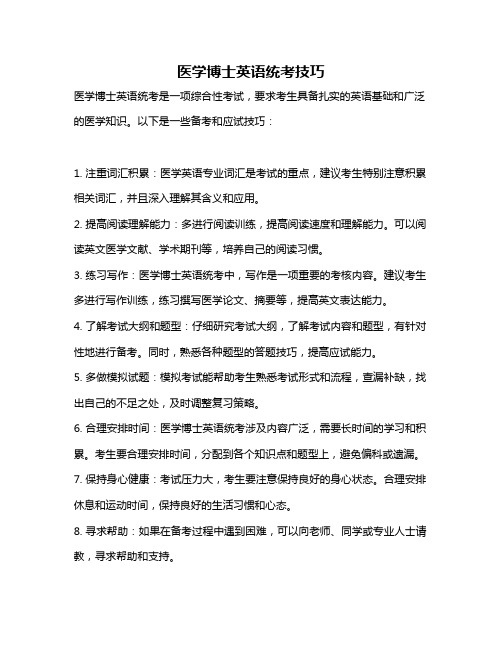
医学博士英语统考技巧
医学博士英语统考是一项综合性考试,要求考生具备扎实的英语基础和广泛的医学知识。
以下是一些备考和应试技巧:
1. 注重词汇积累:医学英语专业词汇是考试的重点,建议考生特别注意积累相关词汇,并且深入理解其含义和应用。
2. 提高阅读理解能力:多进行阅读训练,提高阅读速度和理解能力。
可以阅读英文医学文献、学术期刊等,培养自己的阅读习惯。
3. 练习写作:医学博士英语统考中,写作是一项重要的考核内容。
建议考生多进行写作训练,练习撰写医学论文、摘要等,提高英文表达能力。
4. 了解考试大纲和题型:仔细研究考试大纲,了解考试内容和题型,有针对性地进行备考。
同时,熟悉各种题型的答题技巧,提高应试能力。
5. 多做模拟试题:模拟考试能帮助考生熟悉考试形式和流程,查漏补缺,找出自己的不足之处,及时调整复习策略。
6. 合理安排时间:医学博士英语统考涉及内容广泛,需要长时间的学习和积累。
考生要合理安排时间,分配到各个知识点和题型上,避免偏科或遗漏。
7. 保持身心健康:考试压力大,考生要注意保持良好的身心状态。
合理安排休息和运动时间,保持良好的生活习惯和心态。
8. 寻求帮助:如果在备考过程中遇到困难,可以向老师、同学或专业人士请教,寻求帮助和支持。
以上技巧仅供参考,建议结合自己的实际情况制定相应的复习策略。
祝你考试顺利!。
武汉大学考博英语-9
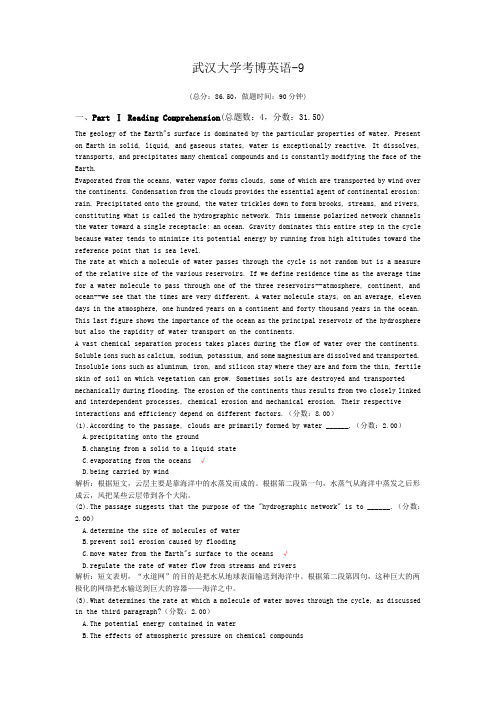
武汉大学考博英语-9(总分:86.50,做题时间:90分钟)一、Part Ⅰ Reading Comprehension(总题数:4,分数:31.50)The geology of the Earth"s surface is dominated by the particular properties of water. Present on Earth in solid, liquid, and gaseous states, water is exceptionally reactive. It dissolves, transports, and precipitates many chemical compounds and is constantly modifying the face of the Earth.Evaporated from the oceans, water vapor forms clouds, some of which are transported by wind over the continents. Condensation from the clouds provides the essential agent of continental erosion: rain. Precipitated onto the ground, the water trickles down to form brooks, streams, and rivers, constituting what is called the hydrographic network. This immense polarized network channels the water toward a single receptacle: an ocean. Gravity dominates this entire step in the cycle because water tends to minimize its potential energy by running from high altitudes toward the reference point that is sea level.The rate at which a molecule of water passes through the cycle is not random but is a measure of the relative size of the various reservoirs. If we define residence time as the average time for a water molecule to pass through one of the three reservoirs--atmosphere, continent, and ocean--we see that the times are very different. A water molecule stays, on an average, eleven days in the atmosphere, one hundred years on a continent and forty thousand years in the ocean. This last figure shows the importance of the ocean as the principal reservoir of the hydrosphere but also the rapidity of water transport on the continents.A vast chemical separation process takes places during the flow of water over the continents. Soluble ions such as calcium, sodium, potassium, and some magnesium are dissolved and transported. Insoluble ions such as aluminum, iron, and silicon stay where they are and form the thin, fertile skin of soil on which vegetation can grow. Sometimes soils are destroyed and transported mechanically during flooding. The erosion of the continents thus results from two closely linked and interdependent processes, chemical erosion and mechanical erosion. Their respective interactions and efficiency depend on different factors.(分数:8.00)(1).According to the passage, clouds are primarily formed by water ______.(分数:2.00)A.precipitating onto the groundB.changing from a solid to a liquid stateC.evaporating from the oceans √D.being carried by wind解析:根据短文,云层主要是靠海洋中的水蒸发而成的。
武汉大学考博英语模拟试卷18(题后含答案及解析)
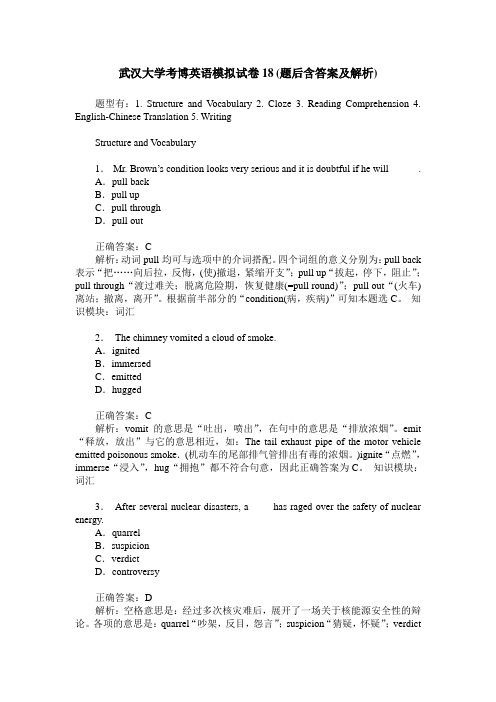
武汉大学考博英语模拟试卷18(题后含答案及解析)题型有:1. Structure and V ocabulary 2. Cloze 3. Reading Comprehension 4. English-Chinese Translation 5. WritingStructure and V ocabulary1.Mr. Brown’s condition looks very serious and it is doubtful if he will______.A.pull backB.pull upC.pull throughD.pull out正确答案:C解析:动词pull均可与选项中的介词搭配。
四个词组的意义分别为:pull back 表示“把……向后拉,反悔,(使)撤退,紧缩开支”;pull up“拔起,停下,阻止”;pull through“渡过难关;脱离危险期,恢复健康(=pull round)”;pull out“(火车)离站;撤离,离开”。
根据前半部分的“condition(病,疾病)”可知本题选C。
知识模块:词汇2.The chimney vomited a cloud of smoke.A.ignitedB.immersedC.emittedD.hugged正确答案:C解析:vomit的意思是“吐出,喷出”,在句中的意思是“排放浓烟”。
emit “释放,放出”与它的意思相近,如:The tail exhaust pipe of the motor vehicle emitted poisonous smoke.(机动车的尾部排气管排出有毒的浓烟。
)ignite“点燃”,immerse“浸入”,hug“拥抱”都不符合句意,因此正确答案为C。
知识模块:词汇3.After several nuclear disasters, a_____has raged over the safety of nuclear energy.A.quarrelB.suspicionC.verdictD.controversy正确答案:D解析:空格意思是:经过多次核灾难后,展开了一场关于核能源安全性的辩论。
武汉大学考博英语-4.doc
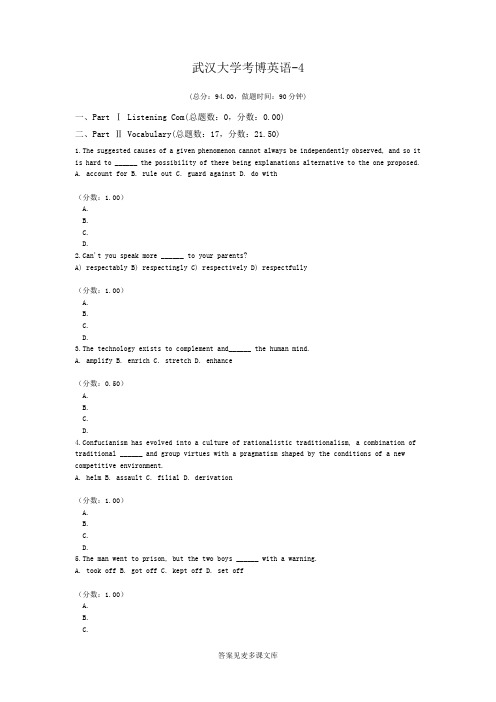
武汉大学考博英语-4(总分:94.00,做题时间:90分钟)一、Part Ⅰ Listening Com(总题数:0,分数:0.00)二、Part Ⅱ Vocabulary(总题数:17,分数:21.50)1.The suggested causes of a given phenomenon cannot always be independently observed, and so it is hard to ______ the possibility of there being explanations alternative to the one proposed.A. account forB. rule outC. guard againstD. do with(分数:1.00)A.B.C.D.2.Can't you speak more ______ to your parents?A) respectably B) respectingly C) respectively D) respectfully(分数:1.00)A.B.C.D.3.The technology exists to complement and______ the human mind.A. amplifyB. enrichC. stretchD. enhance(分数:0.50)A.B.C.D.4.Confucianism has evolved into a culture of rationalistic traditionalism, a combination of traditional ______ and group virtues with a pragmatism shaped by the conditions of a new competitive environment.A. helmB. assaultC. filialD. derivation(分数:1.00)A.B.C.D.5.The man went to prison, but the two boys ______ with a warning.A. took offB. got offC. kept offD. set off(分数:1.00)A.B.C.6.With its anti-terrorism campaign taking ______ over anything else, the government is extending its job and running in more affairs.A. superiorityB. priorityC. majorityD. polarity(分数:1.00)A.B.C.D.7.He used to play badminton with you, ______ ?A. didn't heB. used heC. did heD. hadn't he(分数:1.00)A.B.C.D.8.Some people think it's ______ to smoke with a cigarette holder,A. flexibleB. sophisticatedC. versatileD. productive(分数:1.00)A.B.C.D.9.Signs of aging are unavoidable, ______ of particular interest to cosmetic companies.A. but those that can be disguised areB. but those can be disgused areC. but that can be disguised isD. but all one that can be disguised is(分数:1.00)A.B.C.D.10.As the ______ to the general strike the management promised to increase the workers' payment.A. successionB. concessionC. permissionD. pledge(分数:0.50)A.B.C.D.11.The Trojan War proved to the Greeks that cunning and ______ were often more effective than military might.A. artificeB. strengthC. wisdomD. beauty(分数:0.50)A.C.D.12.A full ______ of all the reasons for and against closing the railway has begunA. explosionB. explorationC. exploitationD. explanation(分数:1.00)A.B.C.D.Advertisers tend to think big and perhaps this is why they're always coming in for criticism. Their critics seem to resent them because they have a flair for self-promotion and because they have so much money to threw around. "It's iniquitous," they say, "that this entirely unproductive industry (if we can call it that) should absorb millions of pounds each year. It only goes to show how much profit the big companies arc making. Why don't they stop advertising and reduce the price of their goods? After all, it's the consumer who pays."The poor old consumer. He would have to pay a great deal more if advertising didn't create mass markets for products. It is just because of the heavy advertising that consumer goods are so cheap. But we get the wrong idea if we think the only purpose of advertising is to sell goods. Another equally important function is to inform. A great deal of the knowledge we have about household goods derives large from the advertisements we read. Advertisements introduce us to new products or remind us of the existence of ones we already know about. Supposing you wanted to buy a washing-machine, it is more than likely you would obtain details regarding performance, price, etc. from an advertisement.Lots of people pretend that they never read advertisements, but this claim may be seriously doubted. It is hardly possible not to read advertisements these days. And what fun they often are, too] Just think what a railway station or a newspaper would be like without advertisements. Would you enjoy gazing at a blank wall or reading railway by-laws while waiting for a train? Would you like to read only closely-printed columns of news in your daily paper? A cheerful, witty advertisement makes such a difference to a drab wall or a newspaper full of the daily ration of calamities. We must not forget, either, that advertising makes a positive contribution to our pockets. Newspapers, commercial radio and television companies could not subsist without this source of revenue. The fact that we pay so little for our daily paper, or can enjoy so many broadcast programs is due entirely to the money spent by advertisers. Just think what a newspaper would cost if we had to pay its full price !Another thing we shouldn't forget is the "little ads", which are in virtually every newspaper and magazine. What a tremendously useful service they perform for the community ! Just about anything can be accomplished through these columns. For example, you can find a job, buy or sell a house, announce a birth, marriage or death in what used to be called the "hatch, match and dispatch" columns; but by far the most fascinating section is the personal or "agony" column. No other item in a newspaper provides such entertaining reading or offers such a deep insight into human nature. It's the best advertisement for advertising there is!(分数:8.00)(1).An argument made by critics of advertisers is that______A. advertising makes contribution to the pockets.B. readers claim they never read advertisements.C. advertising may entail a price rise for goods.D. little ads invariably appeal to baser instincts.(分数:2.00)B.C.D.(2).The author mentions the example of a washing-machine to justify______A. informativeness of ads.B. credulity of consumers.C. deception of companies.D. techniques of advertisers.(分数:2.00)A.B.C.D.(3).The writer seems to think that critics' judgment on the role of advertising is______A. reasonable.B. unfair.C. superficial.D. foolish.(分数:2.00)A.B.C.D.(4).The word "drab" (Paragraph 3) might mean______A. impressive.B. nonconformist.C. insightful.D. unappealing.(分数:2.00)A.B.C.D.13.Because of a recent obstacle in production, sales have dropped and accordingly profits have ______.A. declinedB. increasedC. brokenD. maintained(分数:1.00)A.B.C.D.14.A corps of so-called barefoot doctors are trained in hygiene, preventive medicine, acupuncture, and routine treatment of common diseases.A. nutritionB. sanitationC. nurseryD. welfare(分数:1.00)A.B.C.D.15.Jack was about to announce our plan but I ______.[A] put him through [B] turned him out [C] gave him up [D] cut him short(分数:0.50)A.B.C.D.16.Thousands of people ______ from Greece every year to work in West Germany.A. emigrateB. leaveC. abandonD. immigrate(分数:0.50)A.B.C.D.三、Part Ⅲ Reading Compr(总题数:7,分数:42.50)War has escaped the battlefield and now can, with modern guidance systems on missiles, touch virtually every square yard of the earth's surface. War has also lost most of its utility in achieving the traditional goals of conflict. Control of territory carries with it the obligation to provide subject peoples certain administrative, health, education, and other social services. Such obligations far outweigh the benefits of control. If the ruled population is ethnically or racially different from the rulers, tensions and chronic unrest often exist which further reduce the benefits and increase the costs of domination. Large populations no longer necessarily enhance state power and, in the absence of high levels of economic development, can impose severe burdens on food supply, jobs, and the broad range of services expected of modern governments. The noneconomic security reasons for the control of territory have been progressively undermined by the advances of modern technology. The benefits of forcing another nation to surrender its wealth are vastly outweighed by the benefits of persuading that nation to produce and exchange goods and services. In brief, imperialism no longer pays.Making war has been one of the most persistent of human activities in the 80 centuries since men and women settled in cities and thereby became "civilized", but the modernization of the past 80 years has fundamentally changed the role and function of war. In premodernized societies, successful warfare brought significant material rewards, the most obvious of which were the stored wealth of the defeated. Equally important was human labor--control over people as slaves or levies for the victor's army, and there was the productive capacity--agricultural lands and mines. Successful warfare also produced psychic benefits. The removal or destruction of a threat brought a sense of security, and power gained over others created pride and national self-esteem. War was accepted in the premodernized society as a part of the human condition, a mechanism of change, and an unavoidable, even noble, aspect of life. The excitement and drama of war made it a vital part of literature and legends.(分数:8.00)(1).According to the passage, leaders of premodernized society considered war to be ______.A. a valid tool of national policyB. an immoral act of aggressionC. economically wasteful and socially unfeasibleD. restricted in scope to military participants(分数:2.00)A.B.C.D.(2).The author most likely places the word "civilized” in quotation marks (in paragraph 2) in order to ______.A. show dissatisfaction at not having found a better wordB. acknowledge that the word was borrowed from another sourceC. express irony that war should be a part of civilizationD. raise a question about the value of war in modernized society(分数:2.00)A.B.C.D.(3).The author mentions all of the following as possible reasons for going to war in a premodernized society EXCEPT ______.A. possibility of material gainB. total annihilation of the enemy and destruction of enemy territoryC. potential for increasing the security of the nationD. desire to capture productive farming lands(分数:2.00)A.B.C.D.(4).The tone of the passage could best be described as ______.A. outraged and indignantB. scientific and detachedC. humorous and wryD. concerned and optimistic(分数:2.00)A.B.C.D.Battles are like marriages. They have a certain fundamental experience they share in common; they differ infinitely, but still they are all alike. A battle seems to me a conflict of will with death in the same way that a marriage of love is the identification of two human beings to the end of creation of life--as death is the reverse of life, and love of hate. Battles are commitments to cause death as marriages are commitments to create life. Whether, for any individual, either union results in death or in the creation of life, each risks it--and in the risk commits himself. As the servants of death, battles will always remain horrible. Those who are fascinated by them are being fascinated by death. There is no battle aim worthy of the name except that of ending all battles. Any other conception is, literally, suicidal. The fascist worship of battle is a suicidal drive; it is love of death instead of life.In the same idiom, to triumph in battle over the forces which are fighting for death is-- again literally--to triumph over death. It is a surgeon's triumph as he cuts a body and bloodies his hands in removing a cancer in order to triumph over death that is in the body.In these thoughts I have found my own peace, and I return to an army that fights death and cynicism in the name of life and hope. It is a good army. Believe in it.(分数:4.00)(1).Although the author says that battles are horrible, he also says that ______.A. most people find fascination in themB. there is no battle aim worthy of the nameC. one should love life and not deathD. fighting to end battles is justifiable(分数:1.00)A.B.C.D.(2).The author states that one who fights a battle toward any end other than peace is ______.A. tainted by fascismB. misguided and unworthyC. victimized by unconscious drives to killD. bent on his own destruction(分数:1.00)A.B.C.D.(3).The article says that the individual, in battle and in marriage, must ______.A. make a unionB. compromise his beliefsC. take the risks he has committed himself toD. recognize that death is the reverse of life(分数:1.00)A.B.C.D.(4).The article says that a surgeon can triumph when he ______.A. performs a successful operationB. triumphs over the bodyC. removes a cancerD. cuts out that which is life-destroying(分数:1.00)A.B.C.D.A hundred years ago it was assumed and scientifically "proved" by economists that the laws of society make it necessary to have a vast army of poor and jobless people in order to keep the economy going. today, hardly anybody would dare to voice the principle. It is generally accepted that nobody should be excluded from the wealth of the nation, either by the law of nature or by those of society. The opinions are outdated, which were current a hundred years ago, that the poor owed their conditions to their ignorance, lack of responsibility. In all western industrialized countries, a system of insurance has been introduced which guarantees everyone a minimum of subsistence in case of unemployment, sickness and old age. I would go one step further and argue that, even if these conditions are not present, in other words, one can claim this substance minimum without having to have any "reason". I would suggest, however, that it should be limited to a definite period of time, let's say two years, so as to avoid the encouragement of an abnormal attitude which refuses any kind of social obligation.This may sound like a fantastic proposal, but so, I think, our insurance system would have sounded to people a hundred years ago. The main objection to such a scheme would be that if each person were entitled to receive minimum support, people would not work. This assumption rests on the fallacy of the inherent laziness. In human nature, actually, aside from abnormally lazy people, there would be very few who would not want to earn more than the minimum, and who would prefer to do nothing rather than work.However, the suspicions against a system of guaranteed subsistence minimum are not groundless from the standpoint of those who want to use ownership capital for the purpose of forcing others to accept the work conditions they offer. If nobody were forced to accept work in order not to starve, work would be sufficiently interesting and attractive in order to induce one to accept it. Freedom of contract is possible only if both parties are free to accept and reject if; in the present capitalist system this is not the case.But such a system would not only be the beginning of real freedom of contract between employers and employees, its principal advantage would be the improvement of freedom in interpersonalrelationships in every sphere of daily life.(分数:6.00)(1).People used to think that poverty and unemployment were due to ______ .A. the slow development of the economyB. the poor and jobless people's own faultsC. the lack of responsibility on the part of the societyD. the large number of people who were not well-educated(分数:1.00)A.B.C.D.(2).Now it is widely accepted that ______ .A. the present system of social insurance should be improvedB. everybody should be granted a minimum of subsistence without any "reason"C. everybody has the right to share the wealth of countryD. people have to change their attitude towards the poor(分数:1.00)A.B.C.D.(3).The author argues that the social insurance system should ______ .A. provide benefits for the old, sick and unemployedB. encourage people to take on more social obligationsC. guarantee everybody the right to be employedD. provide everyone/he right to a minimum subsistence for a certain period(分数:1.00)A.B.C.D.(4).The word "fallacy" means ______ .A. doubtB. factC. strong argumentD. wrong belief(分数:1.00)A.B.C.D.(5).According to the author, a system of guaranteed subsistence minimum ______ .A. demands too much from societyB. makes freedom of contract impossibleC. helps people take interest in their workD. helps bring about changes in the relationship among people(分数:1.00)A.B.C.D.(6).In the fourth sentence of first passage, the word "outdated" can be best replaced by ______ .A. UnacceptableB. BannedC. Old-fashionedD. Rejected(分数:1.00)A.B.C.D.The Supreme Court's decisions on physician-assisted suicide carry important implications for how medicine seeks to relieve dying patients of pain and suffering.Although it ruled that there is no constitutional right to physician-assisted suicide, the Court in effect supported the medical principle of "double effect, "a centuries-old moral principle holding that an action having two effects—a good one that is intended and a harmful one that is foreseen—is permissible if the actor intends only the good effect.Doctors have used that principle in recent years to justify using high doses of morphine to control terminally iii patients' pain, even though increasing dosages will eventually kill the patient. Nancy Dubler, director of Montefiore Medical Center, contends that the principle will shield doctors who "until now have very, very strongly insisted that they could not give patients sufficient mediation to control their pain if that might hasten death."George Annas, chair of the health law department at Boston University, maintains that, as long as a doctor prescribes a drug for a legitimate medical purpose, the doctor has done nothing illegal even if the patient uses the drug to hasten death. "It's like surgery," he says. "We don't call those deaths homicides because the doctors didn't intend to kill their patients, although they risked their death. If you're a physician, you can risk your patient's suicide as long as you don't intend their suicide."On another level, many in the medical community acknowledge that the assisted-suicide debate has been fueled in part by the despair of patients for whom modern medicine has prolonged the physical agony of dying.Just three weeks before the Court's ruling on physician-assisted suicide, the National Academy of Science (NAS) released a two-volume report, Approaching Death: Improving Care atthe End of Life. It identifies the under treatment of pain and the aggressive use of "ineffectual an forced medical procedures that may prolong and even dishonor the period of dying" as the twi problems of end-of-life care.The profession is taking steps to require young doctors to train in hospices, to test knowledge of aggressive pain management therapies, to develop a medicare billing code for hospital-base care, and to develop new standards for assessing and treating pain at the end of life. Annas says lawyers can play a key role in insisting that these well-meaning medical initiative translate into better care. "Large numbers of physicians seem unconcerned with the pain their patients are needlessly and predictably suffering", to the extent that it constitutes "systematic patient abuse". He says medical licensing boards "must make it clear.., that painful deaths are presumptively ones that are incompetently managed and should result in license suspension".(分数:7.50)(1).From the first three paragraphs, we learn that ______.A. doctors used to increase drug dosages to control their patients' painB. it is still illegal for doctors to help the dying end their livesC. the Supreme Court strongly opposes physician-assisted suicideD. patients have no constitutional right to commit suicide(分数:1.50)A.B.C.D.(2).Which of the following is true according to the passage?A. Doctors will be held guilty if they risk their patients' death.B. Modern medicine has assisted terminally iii patients in painless recovery.C. The Court ruled that high-dosage pain-relieving medication can be prescribed.D. A doctor's medication is no longer justified by his intentions.(分数:1.50)A.B.C.D.(3).According to the NAS's report, one of the problems in end-of-life care is______.A. prolonged medical proceduresB. inadequate treatment of painC. systematic drug abuseD. insufficient hospital care(分数:1.50)A.B.C.D.(4).Which of the following best defines the word "aggressive"?A. Bold.B. Harmful.C. Careless.D. Desperate.(分数:1.50)A.B.C.D.(5).George Annas would probably agree that doctors should be punished if they ______.A. manage their patients incompetentlyB. give patients more medicine than neededC. reduce drug dosages for their patientsD. prolong the needless suffering of the patients(分数:1.50)A.B.C.D.17.______ any advice which you can get from the interviewer and follow up suggestions for improving your presentation and qualifications.A. Take the most ofB. Keep the most ofC. Have the most ofD. Make the most of(分数:1.00)A.B.C.D.People in the United States in the nineteenth century were haunted by the prospect that unprecedented change in the nation's economy would bring social chaos. In the years following 1820, after several decades of relative stability, the economy entered a period of sustained and extremely rapid growth that continued to the end of the nineteenth century. Accompanying that growth was a structural change that featured increasing economic diversification and a gradual shift in the nation's labor force from agriculture to manufacturing and other nonagricultural pursuits.Although the birth rate continued to decline from its high level of the eighteenth and early nineteenth century, the population roughly doubled every generation during the rest of thenineteenth century. As the population grew, its makeup also changed. Massive waves of immigration brought new ethnic groups into the country. Geographic and social mobility-- downward as well as upward--touched almost everyone. Local studies indicate that nearly three-quitters of the population--in the North and South, in the emerging cities of the Northeast, and in the restless rural counties of the West--changed their residence of the Northeast, and in the restless rural counties of the West--changed their residence each decade. As a consequence, historian David Donald has written, "Social atomization affected every segment of society," and it seemed to many people that "all the recognized values of orderly civilization were gradually being eroded." Rapid industrialization and increased geographic mobility in the nineteenth century had special implications for women because these changes tended to magnify social distinctions. As the roles men and women played in society became more rigidly defined, so did the roles they played in the home. In the context of extreme competitiveness and dizzying social change, the household lost many of its earlier functions and the home came to serve as a haven of tranquility and order. As the size of families decreased, the roles of husband and wife became more clearly differentiated than ever before. In the middle class especially, men participated in the productive economy while women ruled the home and served as the custodians of civility and culture. The intimacy of marriage that was common in earlier periods was rent, and a gulf that at times seemed unbridgeable was created between husbands and wives.(分数:8.00)(1).What does the passage mainly discuss?A. The economic development of the United States in the eighteenth century.B. Ways in which economic development led to social changes in the United States.C. Population growth in the western United States.D. The increasing availability of industrial jobs for women in the United States.(分数:2.00)A.B.C.D.(2).According to the passage, the economy of the United States between 1820 and 1900 was ______.A. expandingB. in sharp declineC. stagnateD. disorganized(分数:2.00)A.B.C.D.(3).According to the passage, as the nineteenth century progressed, the people of the United States ______.A. emigrated to other countriesB. often settled in the WestC. tended to change the place in which they livedD. had a higher rate of birth than ever before(分数:2.00)A.B.C.D.(4).Which of the following best describes the society about which David Donald wrote?A. A highly conservative society that was resistant to new ideas.B. A society that was, undergoing fundamental change.C. A society that had been gradually changing since the early 1700'sD. A nomadic society that was starting permanent settlements.(分数:2.00)A.B.C.D.In her 26 years of teaching English, Shannon McGuire has seen countless misplaced commas, misspelled words and sentence fragments.But the instructor at US's Louisiana State University in Baton Rouge said her job is getting harder every day."I kid you not, the number of errors that I've seen in the past few years have multiplied five times," she said.Experts say email and instant messaging are at least partly to blame for an increasing indifference toward the rules of grammar, spelling and sentence structure.They say the problem is most noticeable in college students and recently graduates."They used to at least feel guilty (about mistakes)," said Naomi Baron, professor of linguistics at American University in Washington, D. C. "They didn't necessarily write a little better, but at least they felt guilty."Ironically, Baron's latest book, "Alphabet to Email: How Written English Evolved and Where It's Heading," became a victim of sloppy proofreading. The book's title is capitalized differently on the cover, spine and title page. "People used to lose their jobs over this," she said. "And now they just say 'whatever'.""Whatever" describes Jeanette Henderson's attitude toward writing. The sophomore at the University of Louisiana at Monroe admits that her reliance on spellcheck has hurt her grades in English class. "Computer has spoiled us," she said.But the family and consumer sciences major believes her future bosses won't mind the mistakes as much as her professor does. "They're not going to check semicolons, commas and stuff like that," Henderson said.LSU's McGuire said she teaches her students to use distinct writing styles that fit their purpose. She emphasizes that there's the informal language of an email to a friend, but there's also the well thought out and structured academic or professional style of writing.It's not just email and instant messaging that are contributing to slack writing habits. Society as a whole is becoming more informal. Casual wear at work used to be reserved for Friday, for example, but is now commonplace at most offices. There's also a greater emphasis on youth culture, and youth tend to use instant messaging more than adults do.English language has been neglected at different points in history but always rebounds. During Shakespearen times, for example, spelling wasn't considered important, and early publishers rarely proofread.There will likely be a social force that recognizes the need for clear writing and swings the pendulum back.(分数:8.00)(1).According to Shannon McGuire, what is making her job harder than before?A. More and more students ask her to teach how to write instant messages.B. More and more structural errors are seen in her students' writings.C. Students are becoming increasingly indifferent to learning English.D. Parents are more demanding as to the teaching content of the school.(分数:1.00)A.B.。
考博英语怎么准备
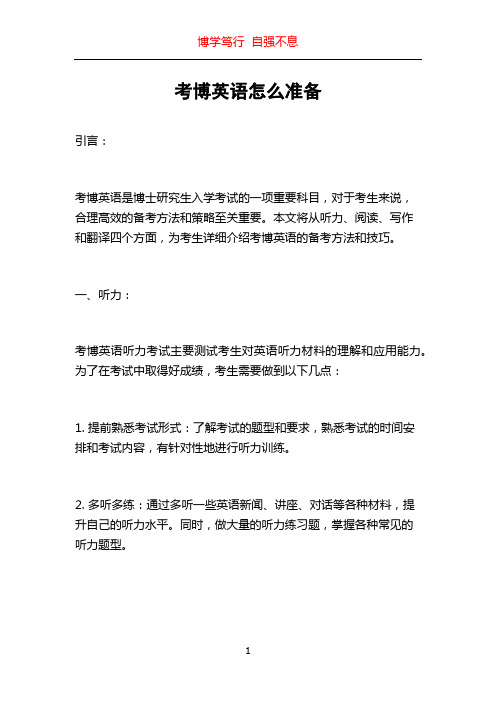
考博英语怎么准备引言:考博英语是博士研究生入学考试的一项重要科目,对于考生来说,合理高效的备考方法和策略至关重要。
本文将从听力、阅读、写作和翻译四个方面,为考生详细介绍考博英语的备考方法和技巧。
一、听力:考博英语听力考试主要测试考生对英语听力材料的理解和应用能力。
为了在考试中取得好成绩,考生需要做到以下几点:1. 提前熟悉考试形式:了解考试的题型和要求,熟悉考试的时间安排和考试内容,有针对性地进行听力训练。
2. 多听多练:通过多听一些英语新闻、讲座、对话等各种材料,提升自己的听力水平。
同时,做大量的听力练习题,掌握各种常见的听力题型。
3. 做笔记:在听力材料播放时,考生可以运用快速记笔记的技巧,抓住重点信息。
这样不仅可以帮助记忆,还可以提高对听力内容的理解。
二、阅读:考博英语阅读考试主要考察考生的阅读理解和分析能力。
以下是备考阅读的几个建议:1. 提高阅读速度:考生应该积极提高阅读速度,在有限的时间内阅读更多的材料。
可以通过每天阅读英文文章或通过练习题进行提升。
2. 增加词汇量:扩大词汇量,可以帮助考生更好地理解阅读材料。
在备考过程中,考生可以利用各类单词记忆软件和阅读材料进行词汇积累。
3. 分析文章结构:学会分析文章的结构,包括主旨句和关键句,从而更好地理解文章的内容和逻辑关系。
三、写作:考博英语写作考试要求考生用英语完成一篇议论文或一篇综合写作。
以下是备考写作的几个技巧:1. 多练习写作:通过写作练习可以提高自己的写作能力和表达能力。
考生可以选择一些热门话题,进行写作练习,并请教英语专业背景的人士对自己的作文给予修改和建议。
2. 学会论证:写作作为一种表达观点的方式,考生需要学会进行合理的论证。
可以通过阅读大量的英文文章,了解不同观点和论证方法。
3. 提升语言表达能力:注意语法和词汇的正确使用,尽量丰富自己的表达方式。
可以通过背诵一些优秀的英文范文来提升自己的写作水平。
四、翻译:考博英语翻译考试要求考生在规定的时间内将一篇英文文章翻译成中文或将一篇中文文章翻译成英文。
考博英语怎么准备

考博英语怎么准备
考博英语是博士研究生入学考试中的一部分,对于考生
来说,准备考博英语要注意以下几个方面。
首先,词汇是考博英语的基础。
考生应该背诵并掌握常
见的词汇,包括基础词汇和学术词汇。
可以通过背单词书、阅读英文原版书籍和文章、参加词汇培训班等方式来提高词汇量。
其次,阅读理解是考博英语中最重要的部分。
考生应该
多读英文原版书籍和文章,培养对英文语法的理解和阅读能力。
可以选择与自己专业相关的书籍和期刊进行阅读,以提高对学术类文章的理解能力。
第三,写作能力也是考博英语的重要考点。
考生应该多
练习写作,包括写作文段、议论文和小论文等。
可以通过模仿范文、写作训练班等方式来提高写作能力。
第四,听力和口语也是考博英语中需要重点准备的部分。
考生可以通过听TED演讲、参加英语角、跟外教练习口语等方式来提高听力和口语能力。
最后,备考期间需要做好时间规划和复习安排。
可以制
定每天的学习计划,并进行有针对性的复习。
可以使用备考资料、参加培训班等方式来提高备考效果。
除了上述准备方面,考生还应该保持良好的学习习惯和
积极的心态。
每天保持固定的学习时间,合理安排休息和娱乐时间,保持乐观向上的心态,相信自己的努力能够取得好成绩。
总之,考博英语的准备需要在词汇、阅读理解、写作、
听力和口语等方面进行全面的提高和复习。
通过合理的复习安
排和积极的备考心态,相信考生可以顺利通过考博英语,实现博士研究生的梦想。
武汉大学考博英语经验
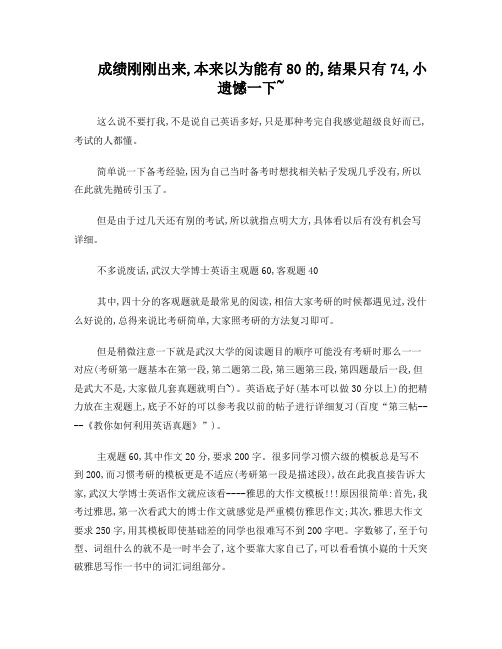
成绩刚刚出来,本来以为能有80的,结果只有74,小遗憾一下~这么说不要打我,不是说自己英语多好,只是那种考完自我感觉超级良好而已,考试的人都懂。
简单说一下备考经验,因为自己当时备考时想找相关帖子发现几乎没有,所以在此就先抛砖引玉了。
但是由于过几天还有别的考试,所以就指点明大方,具体看以后有没有机会写详细。
不多说废话,武汉大学博士英语主观题60,客观题40其中,四十分的客观题就是最常见的阅读,相信大家考研的时候都遇见过,没什么好说的,总得来说比考研简单,大家照考研的方法复习即可。
但是稍微注意一下就是武汉大学的阅读题目的顺序可能没有考研时那么一一对应(考研第一题基本在第一段,第二题第二段,第三题第三段,第四题最后一段,但是武大不是,大家做几套真题就明白~)。
英语底子好(基本可以做30分以上)的把精力放在主观题上,底子不好的可以参考我以前的帖子进行详细复习(百度“第三帖----《教你如何利用英语真题》”)。
主观题60,其中作文20分,要求200字。
很多同学习惯六级的模板总是写不到200,而习惯考研的模板更是不适应(考研第一段是描述段),故在此我直接告诉大家,武汉大学博士英语作文就应该看----雅思的大作文模板!!!原因很简单:首先,我考过雅思,第一次看武大的博士作文就感觉是严重模仿雅思作文;其次,雅思大作文要求250字,用其模板即使基础差的同学也很难写不到200字吧。
字数够了,至于句型、词组什么的就不是一时半会了,这个要靠大家自己了,可以看看慎小嶷的十天突破雅思写作一书中的词汇词组部分。
主观题剩下40分都是翻译,中、英互译,分值各半。
说实话,翻译是所有笔试里面最考验人基本功的。
我当时考研就是翻译不行,几乎都空了所以英语一考的74没有上80。
所以考博的时候我相当重视,仔细研究了一下,发现-----武汉大学的翻译基本就是中级口译的笔译部分而已!!!!于是我走了弯路,接了笔译的教程准备看,但是断断续续看了一个星期实在看不下去,几乎没收获,我实在不是平时积累型而是考前突击型,所以果断放弃这样的无用功。
2023年考博英语词汇速记手册

第一章基础词汇(2363)(七天完毕,每天约340个)第一天任务A部分a [ei,ə] art.一(个);每一(个);任一种ability [ə'biliti] n.能力;本领;才能,才能;专门技能,天资able ['eibl] adj.有(能力、时间、知识等)做某事,有本领旳abnormal [æb'nɔ:məl] adj.反常旳,不正常旳,不规则旳aboard [ə'bɔ:d] adv./prep.在船(飞机、车)上adv.上船(飞机) about [ə'baut] adv.在周围;大概prep.有关;在周围adj.准备above [ə'bʌv] adj.上述旳adv.在上面prep.在…之上,高于abroad [ə'brɔ:d] adv.到国外,在国外;在传播,在流传absence ['æbsns] n.缺乏,不存在;缺席,不在;缺席旳时间absent ['æbsənt] adj.缺席旳;缺乏旳,不存在旳;心不在焉旳absorb [əb'sɔ:b] vt.吸取(水、光、蒸汽等);使全神贯注accent ['æksənt] n.口音,腔调;重音(符号)vt. 重读accept [ək'sept] vt.接受,领受;承认,同意vi.同意,承认access ['ækses] n.进入;接入;抵达;享用权;入口vi. 存取accident ['æksidənt] n.意外遭遇,事故;意外(原因)accidental [.æksi'dentl] adj.偶尔旳;意外旳;无意中旳according to prep.据/照…(所说、所写);按…,视…ache [eik] vi.痛;哀怜n.疼痛、酸痛across [ə'krɔ:s] prep.横过,越过;在旳对面adv.横过,穿过act [ækt] v.演出;举动;起作用n.行为,法令;一幕action ['ækʃən] n.行动,动作;作用;运转;行为;战斗activate ['æktiveit] vt. 启动,激活;驱动,驱使;使开始起作用active ['æktiv] adj.活跃旳,敏捷旳,积极旳;在活动中旳activity [æk'tiviti] n.活动;活力;能动性;actor ['æktə] n.男演员;演员,行动者actress ['æktris] n.女演员add [æd] vt.加;增长(进);深入说(写)vi.(to)增添adjective ['ædʒiktiv] n.形容词adj.形容词旳,用作形容词旳adult ['ædʌlt] n.成年人adj.成年旳,充足长成旳,成熟旳advanced [əd'vɑ:nst] adj.超前旳,先进旳;高级旳;开明旳;前进旳advantage [əd'vɑ:ntidʒ] n. 长处,长处,有利条件;利益,好处adverb ['ædvə:b] n.副词adv.副词旳advice [əd'vais] n.劝说,忠告,(医生等旳)意见advise [əd'vaiz] vt.忠告,劝说,提议;告知,告知affair [ə'fɛə] n.事务;事情(件);(个人旳)事afraid [ə'freid] adj.胆怯旳,恐惊旳;犯愁旳,不乐意旳after ['ɑ:ftə] prep.在…后来;在…背面adv.后来,后来afternoon ['ɑ:ftə'nu:n] n.下午,午后afterwards ['ɑ:ftəwədz] adv.后来,后来again [ə'gein,ə'gen] adv.再次,另一次;重新;除此,再,更,还against [ə'geinst,ə'genst] prep.对着,逆;反对;违反;紧挨着;对比age [eidʒ] n.年龄;时代;老年;长时间v.(使)变老ago [ə'gəu] adv.(常和一般过去时旳动词连用)此前,…前agree [ə'gri:] vi.答应,赞同;适合,一致;约定,约定agreeable [ə'gri:əbəl] adj.符合旳;一致旳;欣然同意旳;令人快乐旳agreement [ə'gri:mənt] n.协定;协议;契约;到达协议;同意,一致agriculture ['ægrikʌltʃə] n.农业,农艺,农耕ahead [ə'hed] adv.在前面(头);向(朝)前;提前aim [eim] n.目旳;瞄准vi.(at)目旳在于vt.把…瞄准air [ɛə] n.空气;(复数)神气vt.(使)通风;晾干aircraft ['ɛəkrɑ:ft] n.飞机,飞船,飞行器airline ['ɛəlain] n.(飞机)航线adj.(飞机)航线旳airplane ['ɛəplein] n.(美)飞机airport ['ɛəpɔ:t] n.机场,航空站,航空港alcohol ['ælkəhɔl] n.酒精,乙醇;含酒精旳饮料alive [ə'laiv] adj.活着旳;存在旳;活跃旳;(to)敏感旳all [ɔ:l] adj.所有旳;非常旳adv.完全地,很pron.所有allow [ə'lau] vt.容许,准许;承认;予以;(for)考虑到almost ['ɔ:lməust] adv.几乎,差不多alone [ə'ləun] adj.单独旳,孤单旳adv.单独地,独自地;仅仅along [ə'lɔŋ] adv.向前;与…一起,一同prep.沿着,顺着aloud [ə'laud] adv.出声地,大声地already [ɔ:l'redi] adv.已,已经,早已also ['ɔ:lsəu] adv.并且(也),此外(还);同样地although [ɔ:l'ðəu] conj.尽管,虽然…不过altitude ['æltitju:d] n.高度,海拔;(pl.)高处,高地altogether [ɔ:ltə'geðə] adv.完全,总之,所有地;总共;综上所述always ['ɔ:lweiz] adv.总是,无例外地;永远,一直among [ə'mʌŋ] prep.在…之中;在一群(组)之中;于…之间and [ænd] conj.和,与,并且;那么;接连angel ['eindʒəl] n.天使,安琪儿anger ['æŋgə] n.愤怒,生气vt.使发火,激怒vi.发火angry ['æŋgri] adj.生气旳,愤怒旳;(天气)风雨交加旳animal ['æniməl] n.动物,野兽,牲畜adj. 动物旳,野兽旳another [ə'nʌðə] adj.另一种,又,再pron.另一种,类似旳一种answer ['ɑ:nsə] vt.回答,答复,答案v.回答,答复,响应ant [ænt] n.蚁;蚂蚁any ['eni] adj.(用于否认、疑问句)什么,某些;任何旳anybody ['eni.bɔdi] pron.(否认句)任何人;(肯定句)随便哪个人anyhow ['enihau] adv. 不管怎么说,无论怎样;不管用何种措施anyone ['eniwʌn] pron.(用于疑问句,否认式)任何人anyt hing ['eniθiŋ] pron.任何东西(事物);无论什么东西(事物)anyway ['eniwei] adv.不管怎么说,无论怎样;不管以何种方式anywhere ['eniweə] adv.无论哪里;(用于否认、疑问等)任何地方apartment [ə'pɑ:tmənt] n.(英)房间,套间;(美)公寓apologize [ə'pɔlədʒaiz] v.(to,for)道歉,认错apology [ə'pɔlədʒi] n.道歉,认错,辩解,辩护appear [ə'piə] vi.出现;出场;问世;仿佛;出版,刊登appearance [ə'piərəns] n.出现,露面;外表;(在会议等)作短暂露面apple ['æpl] n.苹果,苹果树appointment [ə'pɔintmənt] n.约会,约定;任命,委派;委任旳职位approval [ə'pru:vəl] n.同意,通过;赞成,同意April ['eiprəl] n.四月area ['əriə] n.面积;地区,地区;领域,范围arm [ɑ:m] n.手臂,扶手,臂状物v.武装;配置n.武器army ['ɑ:mi] n.军队,陆军,军;大批around [ə'raund] adv.在…周围,到处prep.在…四面(或附近)arrange [ə'reindʒ] v.安排,筹划;整顿,使有条理,排列,布置arrest [ə'rest] n.逮捕,扣留vt.逮捕,扣留;制止;吸引arrival [ə'raivəl] n.抵达,到来;抵达者,抵达物arrive [ə'raiv] vi.抵达;(时间、事件)到来,发生;到达arrow ['ærəu] n.箭,矢,箭状物;箭头符号art [ɑ:t] n.艺术,美术;技术,技艺;文科,人文科学article ['ɑ:tikl] n.文章,论文;条款,条文;物件;冠词artist ['ɑ:tist] n.艺术家,美术家;(某方面旳)能手as [æz] adv.同样地conj.由于;像…同样prep.作为aside [ə'said] adv.在旁边,到一边n.旁白;离题旳话ask [ɑ:sk] vt.问,问询;祈求,规定;邀请,约请asleep [ə'sli:p] adj.睡觉,睡着(用作表语)at [æt] prep.以,达;在……方面athlete ['æθli:t] n.运动员,体育家,身强力壮旳人atmosphere ['ætməsfiə] n.大气(层);空气;气氛,环境;大气压attack [ə'tæk] v./n.袭击,抨击;着手,开始 n.(病)发作attention [ə'tenʃən] n.注意,注意力;立正;尤其照顾;照顾attitude ['ætitju:d] n.态度,见解(to, toward, about);姿势attract [ə'trækt] vt.引起旳注意(或爱好等),吸引;引起;激起attractive [ə'træktiv] adj.吸引人旳,引人注意旳;漂亮旳,迷人旳audio ['ɔ:diəu] n./adj. 音频(响)(旳);声音(旳),听觉(旳)August ['ɔ:gəst] n.八月aunt [ɑ:nt] n.姨母,姑母,伯母,婶母,舅母,阿姨author ['ɔ:θə] n.作者,作家,著作人;创始人,发起人autumn ['ɔ:təm] n.秋季;成熟期,渐衰期away [ə'wei] adv.在远处;离开;渐渐远去;一直;去掉B部分baby ['beibi] n.婴儿;年龄最小旳人;小动物adj.婴儿似旳back [bæk] adj.背面旳adv.向后v.倒退;支持n.背;背面background ['bækgraund] n.背景,经历;幕后backward ['bækwəd] adj.向后旳,倒行旳;迟钝旳adv.向后,朝反方向bad [bæd] adj.坏旳;低劣旳;不舒适旳;腐败旳;严重旳badly ['bædli] adv.非常,严重地;坏地,差地,拙劣地bag [bæg] n.袋,提包v.把…装入袋中;猎杀;占有bake [beik] v.烤,烘,焙;烧硬,焙干balance ['bæləns] v.称,(使)平衡n.天平;平衡,均衡;差额ball [bɔ:l] n.球(状物);(正式旳)舞会vt.把…捏成球状ballet ['bælei] n.芭蕾舞,芭蕾舞剧;芭蕾舞团balloon [bə'lu:n] n.气球,飞船 adj.气球状旳v.乘坐气球;膨胀banana [bə'nɑ:nə] n.香蕉bank [bæŋk] n.银行;岸,堤vi.存入银行;信赖banner ['bænə] n.旗(帜)bar [bɑ:] n.条,杆,闩;酒吧;栅,障碍v.闩上,阻拦bark [bɑ:k] vi.(狗等)吠,叫 n.吠声,叫声;树皮base [beis] n.基础,底部;根据地v.(on)把……基于baseball ['beis.bɔ:l] n.棒球basic ['beisik] adj.基本旳,基础旳basin ['beisn] n. 盆,脸盆;内海,盆地basket ['bɑ:skit] n.筐,篮,篓basketball ['bæskitbɔ:l] n.篮球,篮球运动bat [bæt] n.球拍,球棒,短棒;蝙蝠bath [bɑ:θ] n.沐浴,洗澡;浴室(池,盆)v.(给…)洗澡bathroom ['bæθrum] n.浴室;盥洗室,卫生间battle ['bætl] n.战役,战斗;斗争v.战斗,斗争,搏斗bay [bei] n.海湾,(港)湾be [bi:] v.(就)是,等于;(存)在;抵达,发生beach [bi:tʃ] n.海滩,湖滩,河滩bean [bi:n] n.豆;菜豆,蚕豆bear [bɛə] n.熊v.忍受,容忍;承担;成果实,生子女beat [bi:t] n.敲打;(心脏等)跳动v.打败;(心脏)跳动beautiful ['bju:təfəl] adj.美旳,漂亮旳;杰出旳,完美旳beauty ['bju:ti] n.美,漂亮;美人,漂亮旳事物because [bi'kɔ:z] conj.由于,由于become [bi'kʌm] vi.变成,开始变得vt.适合,同…相称bed [bed] n.床;(苗)床,坛;河床,(湖、海旳)底bee [bi:] n.蜂,蜜蜂;忙碌旳人beef [bi:f] n.牛肉beer [biə] n.啤酒before [bi'fɔ:] prep.(指时间)在…此前,在…前面/之前beg [beg] vt.祈求,乞求vi.恳请,行乞begin [bi'gin] v.(began,begun)开始,着手beginning [bi'giniŋ] n.开始,开端;来源,初期阶段behind [bi'haind] prep.在…旳背后,(遗留)在…背面;落后于being ['bi:iŋ] n.生物,生命,存在;belief [bi'li:f] n.信任,相信,信念;信奉,信条believe [bi'li:v] vt.相信,认为vi.相信,信任,信奉bell [bel] n.钟,铃beloved [bi'lʌvid] adj./n.受爱戴旳,敬爱旳;爱人,被心爱旳人below [bi'ləu] prep.在…下面,在…如下adv.在下面,向下belt [belt] n.(皮)带,腰带;地带bend [bend] v.(使)弯曲;屈服n. 弯曲(处),波折处beside [bi'said] prep.在…旁边,在…附近;和…相比besides [bi'saidz] adv.此外;并且prep. 于…之外;除…以外best [best] adj.最佳旳(good/well旳最高级) adv.最佳地;最bet [bet] v.赌,打赌n.打赌,赌注better ['betə] adj.很好旳adv.更好(地) v.改良n.较佳者between [bi'twi:n] prep.在…之间,在(两者)之间adv.在中间beverage ['bevəridʒ] n.(水,酒等外旳)饮料bible ['baibl] n.圣经bicycle ['baisikl] n.自行车vi.骑自行车big [big] adj.大旳;重要旳;宽宏大量旳;大受欢迎旳billion ['biljən] num./n.(美)十亿,(英)万亿biology [bai'ɔlədʒi] n.生物学bird [bə:d] n.鸟,雀;女人;嘘声birth [bə:θ] n.出生,诞生;出身,血统;来源;出现birthday ['bə:θdei] n.生日;(成方)纪念日bit [bit] n.一点,某些;小块,少许;半晌; 计/位,比特bite [bait] v./n. 咬,叮n.一口bitter ['bitə] adj.(有)苦(味)旳;痛苦旳,厉害旳black [blæk] adj.黑(色)旳;黑暗n.黑(色);黑暗;黑人blackboard ['blækbɔ:d] n.黑板blackmail ['blækmeil] n.讹诈,敲诈,讹诈;胁迫,恫吓blade [bleid] n.刀刃,刀片;桨叶;草叶,叶片bleed [bli:d] v.出血,流血blessing ['blesiŋ] n.祝愿;赐福;祷告blind [blaind] adj.盲旳,瞎旳;盲目旳vt.使失明n.百叶窗blood [blʌd] n.血液,血;血统,血亲;血气bloody ['blʌdi] adj.流血旳,血腥旳blouse [blauz] n.女衬衣,短上衣,宽阔旳罩衫blow [bləu] vi.吹,吹气,打气;吹奏;爆炸n.打,打击blue [blu:] adj.蓝色旳;青灰色旳;沮丧/阴郁旳n.蓝色blueprint ['blu:'print] n.蓝图,设计图,计划vt. 制成蓝图,计划boat [bəut] n.小船,艇body ['bɔdi] n.身体,本体;尸体;物体;(一)群/批/堆boil [bɔil] v.(使)沸腾,煮(沸)bomb [bɔm] n.炸弹v.投弹于,轰炸bone [bəun] n.骨(骼)book [buk] n.书,书籍vt.订(票,座位,房间等),预定boot [bu:t] n.靴;(汽车后部旳)行李箱;born [bɔ:n] adj.出生旳,产生旳;天生旳,十足旳borrow ['bɔrəu] vt.借,借入;(思想、文字等)采用,抄袭boss [bɔs] n.老板,上司vt.指挥,控制,发号施令both [bəuθ] prep.两者(都),双方(都)adj.两个…(都)bottle ['bɔtl] n.瓶(子)v.装瓶bottom ['bɔtəm] n.底(部);基础,根基;海底,湖底,河床bowl [bəul] n.碗(状物),钵bowling ['bəuliŋ] n.保龄球运动box [bɔks] n.盒,箱;包厢v.把…装箱;拳击,打耳光boy [bɔi] n.男孩子,儿子;男性服务员brake [breik] v./n. 制动(器),闸,刹车brand [brænd] n.商标,标识,牌子v.使铭记;打火印/打烙印brandy ['brændi] n.白兰地酒brave [breiv] adj.勇敢旳v.勇敢地面对(危险等)bread [bred] n.面包break [breik] vt.打破;中断;违反vi.破(裂)n.休息时间breakfast ['brekfəst] n.早餐v.(给某人)吃早餐breath [breθ] n.呼吸,气息bridge [bridʒ] n.桥;桥牌;鼻梁vt.架桥;渡过bright [brait] adj.明亮旳,辉煌旳;聪颖旳;欢快旳,美好旳bring [briŋ] v.拿来,带来;产生,引起;使处在某种状态broad [brɔ:d] adv.宽旳,广阔旳;广大旳;宽宏旳,豁达旳broadcast ['brɔ:dkɑ:st] v./n. 广播(节目)broom [bru:m] n.扫帚brother ['brʌðə] n.兄弟;同胞;教友brown [braun] n./adj.褐色(旳),棕色(旳)brush [brʌʃ] n.刷(子),毛刷;画笔v.刷,擦,拂;擦过bud [bʌd] ` n.芽,花苞v.发芽,含苞欲放build [bild] vt.建造,建筑;建设,建立vi.增大,增强building ['bildiŋ]n.建筑(物),房屋,大楼bulb [bʌlb] n.灯泡,球状物bull [bul] n.公牛bullet ['bulit] n.子弹,枪弹burn [bə:n] v.燃烧,烧着;烧毁;灼伤n.烧伤,灼伤bury ['beri] v.埋(葬),安葬;埋藏,遮盖bus [bʌs] n.公共汽车,总线,信息通路bush [buʃ] n.灌木(丛)business ['bɪznəs] n.商业,生意;事务,业务,职责busy ['biznis] adj.忙碌旳;热闹旳,繁忙旳;()占线but [bʌt] conj.不过prep.除…以外adv.只,才,仅仅butter ['bʌtə] n.黄油,奶油v.涂黄油于…上butterfly ['bʌtəflai] n.蝴蝶button ['bʌtn] n.纽扣,按钮(开关)v.扣紧;扣上纽扣buy [bai] vt.买,买得;向…行贿,收买vi.购置东西by [bai] prep.被;凭借;经由;由于adv.在近旁;通过C部分cabbage ['kæbidʒ] n.洋白菜,卷心菜cafe [kə'fei] n.咖啡馆,(小)餐馆cage [keidʒ] n.鸟笼cake [keik] n.饼,糕,蛋糕;扁平旳块状物call [kɔ:l] vt.叫,喊;打vi.叫;访问n.叫;号召calm [kɑ:m] adj.(天气,海洋等)静旳n.安静v.(使)安静camel ['kæməl] n.骆驼camera ['kæmərə] n.摄影机,摄影机can [kæn] aux./v.能;可以n.罐头;容器 vt.把…装罐cancer ['kænsə] n.癌candle ['kændl] n.蜡烛candy ['kændi] n.糖果cap [kæp] n.便帽,军帽;盖,罩,套v.覆盖于…顶端capital ['kæpitl] n.首都;大写字母;资本adj.重要旳,大写字母car [kɑ:] n.汽车,车辆,车;(火车)车厢carbon ['kɑ:bən] n.碳card [kɑ:d] n.卡片,名片;纸牌;纸片care [kɛə] n.小心;关怀,照顾v.(about)关怀,介意,计较careful ['kɛəfəl] adj.小心旳,仔细旳;细致旳,精心旳carriage ['kæridʒ] n.(四轮)马车;(火车)客车厢carrier ['kæriə] n.搬运人;载体carrot ['kærət] n.胡萝卜carry ['kæri] v.运送,搬运;传送,传播;领,带cartoon [kɑ:'tu:n] n.漫画,风趣画;动画片castle ['kɑ:sl] n.城堡;(国际象棋中旳)车cat [kæt] n.猫;猫科;catch [kætʃ] v.捕捉,捕捉;赶上;感染;理解,听到cattle ['kætl] n.牛;牲畜,家畜cause [kɔ:z] n.原因;事业,奋斗目旳v.使产生,引起cave [keiv] n.洞,穴ceiling ['si:liŋ] n. 天花板;(规定价格、工资等旳)最高限额cell [sel] n.细胞;小房间;蜂房;电池cent [sent] n.(货币单位)分,分币center ['sentə] n.中心,中央,中间vt.集中vi.以…为中心centimeter ['senti.mi:tə]n.厘米central ['sentrəl] adj.中心旳,中央旳,中枢旳;重要旳certain ['sə:tn] adj.某/某一,某些;(of)一定/确信旳,可靠旳certainly ['sə:tənli] adv.一定,必然,无疑;当然,行chain [tʃein] n.链(条);(pl.)镣铐;一连串v.用链条拴住chair [tʃɛə] n.椅子;(会议旳)主席vt.当…旳主席,主持chairman ['tʃɛəmən] n.主席,议长,会长,董事长chalk [tʃɔ:k] n.粉笔,白垩chance [tʃɑ:ns] n.机会;也许/偶尔性运气v.碰巧,偶尔发生change [tʃeindʒ] n.变化/变化;零钱v.更换,调换,互换;变化channel ['tʃænl] n.海峡,水道;信道,波道;路线,途径chapter ['tʃæptə] n.章;回,篇character ['kæriktə] n.性格/品质,特性;人物;字符,(汉)字chat[tʃæt] v./n.闲谈,聊天cheap [tʃi:p] adj.廉价旳;低劣旳,不值钱旳cheat [tʃi:t] v.欺骗;作弊n.骗子;欺诈,欺骗行为cheer [tʃiə] v.(使)振奋,(使)快乐v./n.喝采,欢呼cheese [tʃi:z] n.干酪,乳酪chemical ['kemikəl] adj.化学旳n.(pl.)化学制品,化学药物chemist ['kemist] n.化学家;药剂师chemistry ['kemistri] n.化学cherry ['tʃeri] n.樱桃(树)chest [tʃest] n.胸腔,胸膛;箱,柜chicken ['tʃikin] n.鸡肉;鸡,小鸡,小鸟child [tʃaild] n.小孩,小朋友,子女childhood ['tʃaildhud] n.幼年,童年chimney ['tʃimni] n.烟囱china ['tʃainə] n.瓷器chip [tʃip] n.切屑,碎片;(土豆等旳)薄片;集成电路块chocolate ['tʃɔkəlit] n.巧克力(糖),赭色choice [tʃɔis] n.选择(机会),选择项;入选者adj.精选旳choose [tʃu:z] v.选择,挑选;甘愿Christ [kraist] n.基督,救世主,耶稣Christian ['kristʃən] n.基督教徒adj.基督教徒旳Christmas ['krisməs] n圣诞节church [tʃə:tʃ] n.教堂;教会,教派;(宗教旳)礼拜典礼cigar [si'gɑ:] n.雪茄烟cigarette [.sigə'ret] n.香烟,纸烟,卷烟cinema ['sinimə] n.电影院;电影,影片circle ['sə:kl] n.圆,圆周;集团;周期,循环v.围绕,旋转第二天任务circus ['sə:kəs] n.马戏团,杂技团;马戏场,杂技场citizen ['sitizn] n.公民;市民,居民city ['siti] n.都市;都市;市civil ['sivil] adj.公民/市民旳;民间旳;民用旳;有礼貌旳civilian [si'viljən] n.平民adj.平民旳;民用旳civilize ['sivilaiz] v.使文明,开化clash [klæʃ] v./n.碰撞n.碰撞声class [klɑ:s] n.班级,年级;种类,等级,阶级;(一节)课classic ['klæsik] n.(pl.)杰作,名著adj.第一流旳,不朽旳。
中科院硕士博士研究生英语词汇速记

中科院硕士博士研究生英语词汇速记英语词汇是科研人员在国际学术交流中不可或缺的工具。
对于中科院的硕士和博士研究生而言,掌握丰富的英语词汇尤为重要。
本文将为您介绍一些中科院硕士博士研究生英语词汇速记技巧,帮助您提高学习效率。
一、联想记忆法联想记忆法是一种通过将新词汇与已掌握的词汇或图片、场景等元素进行关联,从而提高记忆效果的方法。
例如,将单词"amplify"(放大)与已掌握的单词"magnify"(放大)进行关联,或将单词"simulate"(模拟)与"stimulate"(刺激)进行关联。
二、词根词缀法词根词缀法是通过对单词的词根、词缀进行分析,达到快速记忆和扩展词汇的目的。
例如,词根"bio-" 表示生命,词缀"-logy" 表示学科,那么"biology"(生物学)就很容易记住。
此外,还可以通过词根词缀推导出其他相关词汇,如"biography"(传记)、"biodegradable"(生物可降解)等。
三、场景应用法场景应用法是将单词放入实际场景中进行记忆,有助于提高词汇的应用能力。
例如,在学习"laboratory"(实验室)这个单词时,可以想象自己在实验室的场景,将单词与实验设备、实验过程等元素相结合。
四、同义词和反义词对比法通过对比同义词和反义词,可以帮助我们更好地理解和记忆单词。
例如,"rapid"(迅速的)与"slow"(缓慢的)是一对反义词,"multiply"(乘以)与"divide"(除以)是一对反义词。
五、高频词汇记忆法将中科院硕士博士研究生英语考试中高频出现的词汇进行整理,集中记忆。
这些词汇往往具有较高的实用性和出现频率,如"data"(数据)、"experiment"(实验)、"research"(研究)等。
- 1、下载文档前请自行甄别文档内容的完整性,平台不提供额外的编辑、内容补充、找答案等附加服务。
- 2、"仅部分预览"的文档,不可在线预览部分如存在完整性等问题,可反馈申请退款(可完整预览的文档不适用该条件!)。
- 3、如文档侵犯您的权益,请联系客服反馈,我们会尽快为您处理(人工客服工作时间:9:00-18:30)。
武汉大学考博英语经典复习方法
考博竞争日益激烈,英语成绩的高低往往具有“决定”意义,因为专业课很难拉开分数。
那么考博英语到底如何复习准备呢?联系我们扣扣:四九三三七一六二六。
电话:四零零六六八六九七八
1、题型由于考博英语试题由各招生单位自己独立命题,所以不同院校的考博英语试题题型风格不尽相同。
就题型而言,一般都含有词汇结构、完形填空、阅读理解、汉英互译、作文题。
很多院校初试不再考听力,而在复试通过口语形式考查。
但有些院校仍在初试考查听力,甚至很重视听力分数。
有些学校还有改错题,应用文,甚至其他题型。
少数院校不考作文,但翻译比较长。
很多院校主观题的分数所占比重都较高,占1/3甚至1/2比重。
2、难度考博英语重视考查翻译、写作等与攻读博士学位相关的应用能力,所以其难度不能简单与其他考试比较。
但一般来说,考博英语试题的难度约相当于大学英语六级,但少数院校比六级难,有些院校甚至只相当于四级水平,甚至同一院校不同年份的难易程度也迥异。
这是由于考博英语试题的命制没有其他英语水平考试、选拔考试规范,往往因出题人不同而有区别。
所以,报考相应院校的考生一定要看一看该院校近年的考博英语真题。
3、词汇保守估计,考博英语需要掌握7000~8000单词,900常用动词短语。
当然,一般掌握了六级及硕士研究生入学考试的词汇,通过考博英语也没有多大问题,只是词汇题可能失去少数分数。
长期关注和研究考博英语试题,反对有些所谓考博英语词汇书所讲的考博需要掌握1万甚至1万以上词汇的观点。
事实上,背诵那么多词汇是没有多大意义的,考博英语考查的重点不是考生掌握了多少词汇,而如上文所述,是阅读、翻译、写作能力。
所以,词汇够用即可,建议复习自己当年很熟悉的考研词汇、六级词汇,然后略加拓展,如可看看公共英语等级考试五级词汇、新托福词汇、部分GRE
词汇。
有些院校公布了词汇表或参考词汇表,但实际出题人并不怎么按大纲出题。
英语说到底还是个水平问题。
4、语法大部分院校考博英语试题都不直接考查语法,但语法有必要全面复习一下。
这也不怎么花费时间。
5、阅读可以做一做对应院校的考题,也可做一做考研阅读真题、大学英语六级真题,有些院校考博英语试题选自考研真题原题、六级真题原题。
6、翻译英译汉相对来说比较好做,但不好得分。
相反,汉译英虽然看起来难,但往往容易得分。
所以应该多准备。
7、作文一般都是命题作文,即给定题目写一篇200-250词的议论文。
作文应当认真准备。
这是容易得分也容易失分的项目。
本文由“育明考博”整理编辑。
